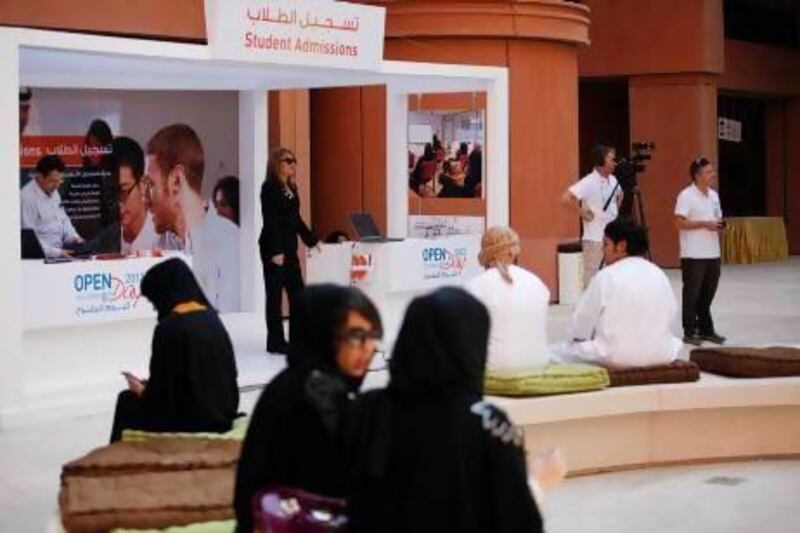ABU DHABI // A strong emphasis on research and good job prospects were two main attractions at Masdar Institute of Science and Technology, students said yesterday.
Those studying at several of the country's universities, including the federal Higher Colleges of Technology (HCT) and the private Ajman University of Science and Technology, visited the facility's open day yesterday.
Masdar Institute, which only takes students at master's and PhD level, is one of the few in the country focused on research, much like the federal UAE University and the American University of Sharjah.
Emirati student Omar Al Nemer, 24, is in his first year studying microsystem engineering at Masdar and brought his cousin to visit.
"It's a very good environment to study in and there is so much opportunity for us afterwards," Mr Al Nemer said.
"There are so many companies that are interested in the kind of student graduating from here, especially in Abu Dhabi."
Omar's cousin, Abdullah Al Nemer, 22, still has three years of his civil engineering degree at Dubai Men's College, part of the HCT, but said he was already thinking of what to do next.
"There are a lot of fields of research here which interest me and by the time I would come, they say there will be more," he said.
Eman Hassan, 21, has one and a half years of her chemical engineering degree left at UAE University.
The Jordanian, who was born in the UAE, wants to do everything possible to secure a place at the Masdar Institute.
"Masdar is really helping the country a lot, reducing the consumption of energy. The programmes here are very developed," she said.
"This place attracts the best students from around the world so it's not just about studying when you come to a place like this. The people here bring a lot of knowledge and experience, too."
Funded by the Abu Dhabi Government, the institute took its first students in 2009 and has some of the best facilities and laboratories in the country.
It offers students a unique opportunity to be at the forefront of research in sustainability.
"Students will be watching and involved in a project funded by government or industry and obviously they want a result, so that makes the student learn more about the company," said Dr Fred Moavenzadeh, president of the Masdar Institute.
"And after that, the student may get the opportunity to work with them."
Dr Moavenzadeh said that in the United States, it was very common for academia and industry to be closely linked, but that relationship in the UAE is still in its infancy.
However, there is progress, he said.
"Industry is realising there is a great receiver of knowledge and know-how here that, if they connect to, they'll benefit a great deal," Dr Moavenzadeh said
Employability is not the only issue on students' minds, said Stephen Lee, director of institutional research.
"Students here are really interested in research," he said.
"When students see the campus for real, it gives them a different and better impression than just seeing the website.
"When they see the place and we explain what we have here, they're impressed. They see the solar panels, they speak to the faculty, they really feel what it is to study here."
Of the institute's 127 graduates so far, 54 per cent are already in jobs, 26 per cent are studying for PhDs atMasdar and a further 10 per cent are in other universities. Only 10 per cent are still looking for work.
All Masdar students are fully sponsored by the Abu Dhabi Government, given free board, tuition and a monthly allowance as the institute tries to attract the world's best minds.
In spite of the enthusiasm shown by students, Dr Moavenzadeh admits there is a lot of work to do to educate the community - students, government and industry - on what the institute does.
"It's still a challenge for us to get the message out there," he said.
"It's our responsibility to tell the public, government or industry that what we do is relevant to the needs of Abu Dhabi and the UAE, addressing vital issues such as the scarcity of water."






